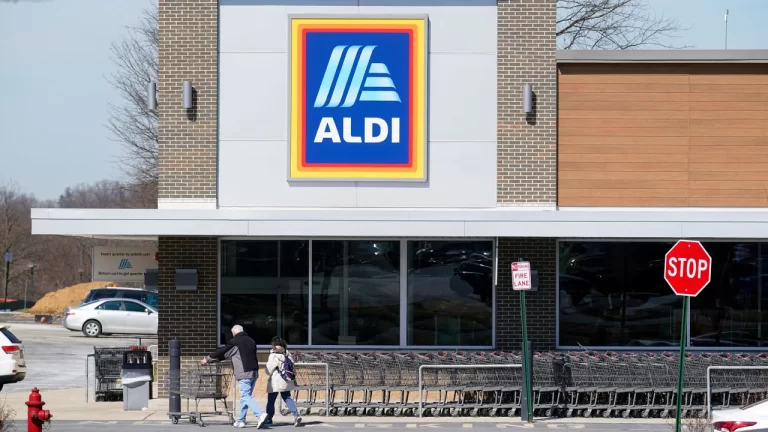Grocery shoppers in the Southeast can expect to see more Aldi stores starting 2024.
The German supermarket giant is acquiring Winn-Dixie and other grocery stores in the Southeast in a move to increase its presence in the region, the company announced Wednesday. Some of the nearly 400 Winn-Dixie locations Aldi is acquiring will keep the familiar red-and-white Winn-Dixie branding and traditional store layout.
Aldi will be converting a “significant amount” of Winn-Dixie and Harveys stores to its bare-bones store format over the coming years, CEO Jason Hart said to CNN. The acquisition – which includes Harveys Supermarket – will add locations across Alabama, Florida, Georgia, Louisiana and Mississippi to Aldi’s portfolio. Almost 300 of these stores are based in Florida.
The transaction is expected to close in the first half of 2024 and is pending regulatory approval. It’s part of Aldi’s long term plan to expand across the US – it previously announced it is opening 120 new stores with a goal of 2,400 stores by the end of 2024.
“The Southeast is a big part of our growth initiative across the country,” Hart said. “In fact, it [was] a focus of our growth initiative even before this acquisition — so it was the perfect kind of confluence of factors.”
Hart added that the acquisition could also serve as a real estate leasing opportunity for Aldi, as the stores require only about half the square footage of traditional grocery stores. Aldi emerged as a winner during a period of inflated food prices as customers looked for cheaper options.
Winn-Dixie and Harveys Supermarket had long been staples in the Southeast region. But for years, the grocery chains and its parent company have been plagued by financial difficulties. In 2018, Southeastern Grocers said that it planned to file for bankruptcy and close 94 stores. Winn-Dixie shuttered about a third of its 900 stores in 2005 and laid off almost 30% of its staff.
Aldi has not disclosed how many of the Winn-Dixie and Harveys stores it plans on converting, or how much the deal cost. But it will come as a relief to Southeastern Grocers which has struggled to compete for years, said Neil Saunders, managing director of GlobalData.
“Under the stewardship of Aldi, the business will have access to much deeper pockets and a ruthlessly efficient and effective supply chain which will help reduce costs,” Saunders said.
In the agreement, Aldi will buy all of the Florida-based company’s capital stock in cash. Aldi plans on opening 20 new locations in the Southeast region by the end of this year, ahead of the closing of the acquisition.
“Aldi will operate Winn-Dixie and Harveys Supermarket stores with the same level of care and focus on quality and service, as we also evaluate which locations will convert to the Aldi format to better support the neighborhoods we’ll now have the privilege of serving,” Hart added.
Southeastern Grocers agreed to sell its 28 Fresco y Más stores to Fresco Retail Group, a grocery investment group. The Hispanic grocery chain will also keep its name. Last year, Kroger announced it was buying Albertsons in a nearly $25 billion merger between the two largest grocery stores in the country — but that deal, which is expected to close in 2024, is facing antitrust pushback.
Competition for Publix
Not only is Aldi buying Winn-Dixie’s prime retail locations in states like Florida, but it’s also buying its loyal and value-driven fan base, said Phil Lempert, editor of trade publication Supermarket Guru. The king of grocery stores in the Sunshine State remains Publix, with a devoted customer base throughout its 857 Florida locations.
But sometimes shoppers don’t want to decide between dozens of brands of staples such as olive oils, Lempert said. Aldi’s combination of quality, curation and value make it a popular choice for younger shoppers in one of the fastest growing regions in the country. And when merging those values with the existing Winn-Dixies, “that’s going to be a really tough competitor for Publix,” Lempert said.
“I would not want to own a supermarket across the street from an Aldi,” Lempert said. Aldi doesn’t normally acquire companies, and Saunders said the merger will give the German brand the opportunity to experiment with different types of store models.
“The addition of Winn-Dixie and Harveys gives it a different proposition to test and if it is not successful, Aldi can always convert more stores to its own format over time,” Saunders said. Aldi already views itself as a strong competitor.
“We’ve proven that that we come to communities across the states, we add value, we attract customers, and I think that’s definitely a testament to the demand,” Hart said.
— CutC by cnn.com


